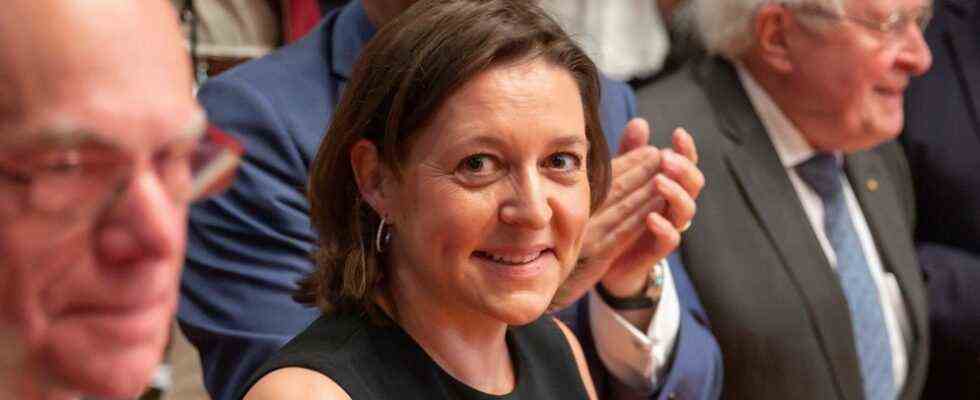The dream is reality, it says at the beginning of the book. Not this book, the novel by Husch Josten, “An honest lie”, but the book around which this novel revolves. A slogan from May 1968, the event that gave the 20th century its dynamism, with its imagination – its dreams – of resistance, rebellion and the reckoning of a dark, brutal past. “The German French” is the name of the book in the book. It was the first of the successful French author Margaux Leclerc, and it was very different from all of her others. The German French was her uncle Doron Mayer-Dos, a mixture of Jean-Paul Sartre and the elderly Robert Redford, as it is once said, a staunch rebel, a charismatic leader for all sixty-eighties.
Margaux lives with her husband Philippe in the Domaine de Tourgéville, a luxurious summer house near Deauville in Normandy. An intellectual, elegant couple, upscale lifestyle, they invite friends and acquaintances to dinner several times a week, then there are exquisite dishes and fine wines and discussions, not always in-depth, on all upcoming topics. For four months in the summer of 2019, the young Elise – French mother, German father – will be hired by the two of them as a housemaid; she is twenty-four, has just finished her studies and will take up a job at a publishing house in Paris later in the year, but is now trying first clearing her mind through practical work: cleaning, shopping, cooking, keeping a household running. The couple’s “sociability”, typically French, fascinates Elise, but these two also have a secret, a destructive discrepancy. “How loud the silence between Philippe and Margaux must be because of this difference.”
You have to march off even if you don’t know your destination, says your uncle
Elise is the narrator of the story; a discreet curiosity predestines her to listen to her ability to listen to the evening discussions, sometimes from the kitchen, while she prepares the next course. It will have decisive experiences this summer – quickly followed by the deadlock, the lockdown that the pandemic imposed on France and Europe the following year.
It wasn’t until many years later that Elise reported about this summer, when she was already a successful writer herself, living on a boat that she called a torus – a topological object shaped like a lifebuoy (or a donut). Husch Josten’s book is constructed as a time capsule, from the future, from the middle of this century. Elise is just as old when she writes as Margaux was in the year of which she is writing, fifty-six. This is what creates the tension in this storytelling, the peculiar mixture of closeness and distance, immediacy and reflection – an older woman tries to put into words the emotional and intellectual turmoil that gripped her in her youth – and all of Europe. Flirtatious when she inserts “I’m sure you vaguely remember” when quoting a well-known Dean Martin quote.
The decades after the summer of 2019 are left out, only the big – for us current – debates are present in the book, in the evening parties: anti-Semitism, Islamism and migration, populism and police violence, social media and conspiracy narratives, terrorism, evil, plus a violent nostalgia of the revolutionary, “the left opposing milieu, incense sticks, Guevara posters, anti-authoritarian hammocks, commune and trallala … And now Margaux too. “Elise insists on striving for independence, Uncle Doron wants to convince her how important it is to act together, to belong to a group. You have to march off even if you don’t know your goal, he postulates.
Husch Josten: An honest lie. Novel. Berlin Verlag, Berlin / Munich 2021. 240 pages, 20 euros.
The domaine is a round castle on the outside, eccentric luxury on the inside (and also reminiscent of a UFO). “Weather-tanned wood, light-colored stone, half-timbering on the upper floor, floor-to-ceiling windows on the ground floor, red-brown terracotta shingles on the roof.” In the middle a swimming pool, open at the top, in the middle a tower with a spiral staircase, one could speak of a donut pool here. The areas merge into one another without walls. Like one of the romantic palaces that rich burghers and aristocrats built in their parks in the nineteenth century, predominantly in England. The domain really exists, it was the house of the filmmaker Claude Lelouch, Husch Josten thanks him in a follow-up note for opening it to her. The tragic-absurd happening that connects Margaux and Philippe seems like something out of a Lelouch film, two climbers at a time when France is reorganizing its identity – Husch Josten, too, mixes crude melodrama with dreamlike sophistication.
The spiral of dream and reality also leads directly to the cinema in the book. They want to make a film out of Margaux’s first book, for this purpose illustrious guests are invited, including the actor Ocean Green, Oscar winner, who is slated for the role of Doron. The debate suggests, and Elise explicitly confirms it: This is how Oscar contenders come about.
The nights in the Domaine with its culture of debate cannot hide how severe the social rifts are in French society. The German Frenchman Doron alone is a figure of mediation and reconciliation: “He had given each individual the feeling, meant, asked, to be important and, when he left, threw everyone back on himself, on our usual coexistence, on the unsatisfactory Field of circular thinking, one-dimensionality and comfortable silence. “

